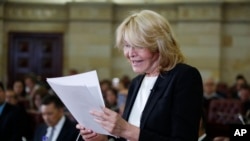A group of exiled Venezuelan judges met in Colombia’s capital Tuesday to hear corruption allegations against Venezuela’s President Nicolas Maduro, launching a symbolic process that could further tarnish the embattled socialist leader's reputation.
The jurists, known as the “Supreme Court in Exile,” held a public hearing in Colombia’s elegant congressional building to review accusations linking Maduro to the giant Brazilian construction company Odebrecht, which has acknowledged paying bribes in many Latin American countries.
The proceedings were notably one-sided: While an attorney was assigned for Maduro, his government considers the body illegitimate and both the judges and prosecutor have conflicts of interest, having fled into exile to avoid Maduro’s reach.
Linked to Odebrecht
Ousted Venezuelan Chief Prosecutor Luisa Ortega, who long had access to the country’s investigative files, told the jurists that she has evidence that Maduro sought $50 million from Odebrecht to finance his 2013 presidential campaign. Ortega said that in exchange for Odebrecht’s help, Maduro promised the construction firm new public works contracts in Venezuela as well as help in facilitating tens of millions of dollars in overdue payments.
“Even as the country went through a humanitarian crisis, his priority was (to pay) Odebrecht,” said Ortega, who fled Venezuela last year after falling out with Maduro’s socialist administration. “This is a president that has destroyed Venezuela,” she said.
Ortega said she had obtained testimony from Brazilian campaign advisers, who said they received millions of dollars from Maduro and his allies, in some cases, in suitcases full of cash. She also said she had tracked payments from Odebrecht accounts into offshore banks linked to Maduro’s cronies and asked for the Venezuelan president to be tried for corruption and money laundering.
Maduro's lawyer
The lawyer named to represent the president, Andres Lindo, acknowledged he had not spoken with Maduro, but added, “I will do my best in the current circumstances to defend him.”
The jurists on the panel said they will review the evidence and decide whether the case should go to “trial.”
The “Supreme Court in Exile” is made up of 33 jurists who were appointed to Venezuela's Supreme Court last year by the opposition-led congress. Maduro accused them of treason, claiming they were trying to illegally replace a group of Supreme Court justices that had been appointed by his political allies in 2015, before the opposition took control of congress in a landslide electoral victory.
The newly appointed judges were not able to take their seats and instead fled the country to avoid time in prison. Now they live in several countries in the region including Panama, Colombia, Chile and the United States, where the court’s president is based.
Rulings ignored
The jurists hold regular meetings via Skype and have issued rulings that include ordering Venezuela’s government to let international humanitarian aid into the country and to stop issuing the petro, a crypto-currency that was recently hit with U.S. sanctions.
Maduro’s government has ignored the rulings. While most countries in the region have tolerated the court in exile and allowed its judges to hold meetings and conferences, none have explicity recognized its legitimacy.
However, the court has received the support of the Washington-based Organization of American States, whose secretary general has accused Maduro of becoming a dictator.




